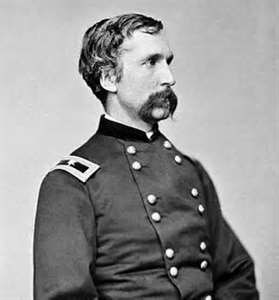
Born in 1828 in Maine, Chamberlain was a college professor before the war. He went into the army as a Lieutenant Colonel in the 20th Maine. He fought at Antietam, Fredericksburg, Chancellorsville, Gettysburg (his actions there won him a Medal of Honor), Spotsylvania, and Cold Harbor. On the third day of the opening action of the siege, Col. Chamberlain was wounded while leading his brigade against the Confederate position in the area of Baxter Road. The severity of the injuries were such that the Union Army published his obituary prematurely, as he would survive them after months in the hospital. For his actions that day he was promoted on the field to a brigadier general. Towards the end of the Petersburg Campaign, Chamberlain played a pivotal role on March 31, 1865, in the battle of White Oak Road, as he and his men turned an initial Union setback into a Union victory. The morning of April 12, 1865 found Chamberlain designated as commander of the parade on the occasion of the formal surrender of the arms and colors of the Army of Northern Virginia. He left the army in 1866. After the war Chamberlain served as Governor of Maine, president of Bowdoin College, and president of a railroad construction company. He died in 1914. Back to Biographies |
Last updated: November 25, 2023
